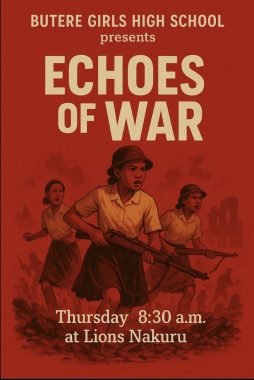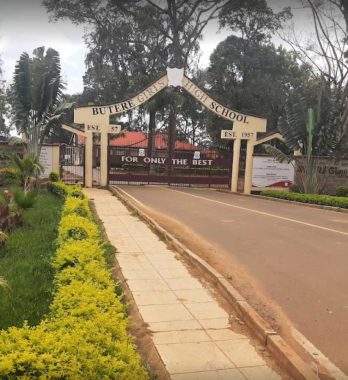The Kenya Human Rights Commission (KHRC) has condemned the government for what it terms a violent and unconstitutional crackdown on students, journalists, and members of the public during a school play by Butere Girls’ High School at the Kenya Schools and Colleges National Drama Festival.
In a strongly worded statement released on Thursday, April 10, 2025, the commission likened the early morning scenes—where police lobbed teargas and blocked entry to the venue—to the Gestapo playbook, accusing state agencies of suppressing artistic freedom and defying a Court order.
The play, Echoes of War, had been rescheduled for Thursday at 6 am in what KHRC described as a criminal attempt by the Ministry of Education and the Drama Festival Committee to technically comply with a court directive while still frustrating the performance.
“Students of Butere Girls’ High School responded with patriotic courage to the cruelty of the Ministry of Education in scheduling their performance at 6 a.m. as part of state repression by singing the national anthem and walking off the stage,” the statement reads in part.
“This violent assault on the freedoms of thought, conscience, information, expression and opinion—guaranteed by no less than the Constitution—violates the state’s obligation to provide education to children,” KHRC added.

KHRC also noted that several schools have opted not to perform at the festival, citing a stifling and repressive atmosphere that has engulfed this year’s event.
State censorship
The human rights body further linked the suppression to a broader trend of censorship under President William Ruto’s administration.
Drawing parallels to the Gen-Z-led anti-Finance Bill protests in 2024, the commission warned that the state’s tactics only confirm the truth within the art being targeted.
“Over the 66 years that the Kenya Schools and Colleges Drama Festival has been held each year, it has evolved into a site for speaking truth to power. Still, none of the regimes that have ruled over Kenya in that time has exposed its vulnerability through crude repression as in the present case. The Ruto regime fears the truth that 50 students speaking from a high school auditorium can infect the public,” the statement further reads.

Drawing historical parallels, the commission likened the current situation to the government’s response to the Kamirithu Community Educational and Cultural Centre in the late 1970s, a revolutionary theatre initiative led by renowned author Ngũgĩ wa Thiong’o that was eventually banned and destroyed for challenging the ruling elite.
“When the play Ngaahika Ndeenda became popular for challenging the ruling elite, the government responded with brutal repression, razing the cultural centre and banning the theatre,” KHRC stated.
The crackdown on the Echoes of War’play, the commission said, follows in this pattern of silencing politically conscious art.
Accountability
KHRC has issued several demands, including allowing the students to perform the play without conditions or reprisals, and that all individuals involved in the unconstitutional interference step down and face prosecution.
“We demand that the Cabinet Secretaries and Principal Secretaries for Interior and Education, the Inspector-General of Police, the Director of Criminal Investigations, and all regional and local education and security officials involved in this unconstitutional interference immediately resign and face prosecution for abuse of office, violation of human rights, and contempt of the court order,” the commission stated.
It further urged the government to investigate the assault on six journalists who were covering the event and to uphold media freedom.